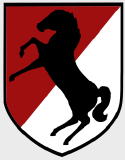Hobby Master HG5502 US M48A3 Patton Medium Tank - "Wild One 3", 919th Engineers (Armored), 11th Armored Cavalry Regiment, South Vietnam, 1966 (1:72 Scale)
"We will carry out a campaign characterized by shock, by surprise, by flexibility ... and by the application of overwhelming force."
- CENTCOM commander General Tommy Franks commenting on the conduct of Operation: Iraqi Freedom, March 21st, 2003
 The M48 Patton is a main battle tank (MBT) that was designed in the United States. It was the third tank to be officially named after General George S. Patton, commander of the U.S. Third Army during World War II and one of the earliest American advocates for the use of tanks in battle. It was a further development of the M47 Patton tank. The M48 Patton was in U.S. service until replaced by the M60 and served as the U.S. Army and Marine Corps's primary battle tank in South Vietnam during the Vietnam War. It was widely used by U.S. Cold War allies, especially other NATO countries.
The M48 Patton is a main battle tank (MBT) that was designed in the United States. It was the third tank to be officially named after General George S. Patton, commander of the U.S. Third Army during World War II and one of the earliest American advocates for the use of tanks in battle. It was a further development of the M47 Patton tank. The M48 Patton was in U.S. service until replaced by the M60 and served as the U.S. Army and Marine Corps's primary battle tank in South Vietnam during the Vietnam War. It was widely used by U.S. Cold War allies, especially other NATO countries.
The M48 Patton tank was designed to replace the previous M47 Pattons and M4 Shermans. Although largely resembling the M47, the M48 was a completely new design. It was the last U.S. tank to mount the 90 mm tank gun, with the last model, the M48A5, being upgraded to carry the new standard weapon of the M60, the 105mm gun. Some M48A5 models served well into the 1980s with American forces, and many M48s remain in service in other countries. The Turkish Army has the largest number of modernized M48 MBTs, with more than 1,400 in its inventory. Of these, around 1,000 have been phased out or are in storage, or have been modified to ARVs.
Pictured here is a 1:72 scale replica of a US M48A3 Patton medium tank nicknamed "Wild One 3", which was attached to the 919th Engineers (Armored), 11th Armored Cavalry Regiment, then deployed to South Vietnam during 1966.
Sold Out!
Dimensions:
Length: 4-3/4-inches
Width: 1-1/2-inches
Release Date: August 2013
 Historical Account: "Red Devils" - On August 5th, 1966, the first elements of the 919th Engineer Company (Armored), Regimental engineers of the 11th Armored Cavalry Regiment, departed Fort Hood, Texas, via Bergstrom Air Force Base for the Republic of Vietnam. By 8 August, the entire company 0f 154 combat ready engineers had arrived at LONG BINH, the temporary home of the 11th Armored Cavalry Regiment 20 kilometers northeast of Saigon.
Historical Account: "Red Devils" - On August 5th, 1966, the first elements of the 919th Engineer Company (Armored), Regimental engineers of the 11th Armored Cavalry Regiment, departed Fort Hood, Texas, via Bergstrom Air Force Base for the Republic of Vietnam. By 8 August, the entire company 0f 154 combat ready engineers had arrived at LONG BINH, the temporary home of the 11th Armored Cavalry Regiment 20 kilometers northeast of Saigon.
With the beginning of combat operations in the first part of October 1966, the men of the 919th "Red Devils" found themselves in the unique position of being the only armored engineers fighting in Vietnam. In essence, they had to write the textbook for the armored engineer operations in a counterinsurgency environment. The 919th Engineers also had the distinction of being the first element of the 11th Armored Cavalry Regiment to inflict casualties upon the Viet Cong.
Missions tasked to the Company are numerous. Building timber trestle bridges, searching booby-trapped tunnel complexes, destroying Viet Cong tunnel and bunker fortifications, constructing ford and culvert sites, conducting river crossing operations, clearing landing zones, constructing fighting positions, detecting removing, and destroying Viet Cong mines on road sweeping operations, procuring and delivering barrier material for the upgrading of ARVN Regional Force and Popular Force outposts, and fabricating aircraft revetments are only a few of the missions assigned to this versatile unit. The heavy workload has not prevented the 919th Engineers from foiling Viet Cong plans. in the night of November 16th, 1966, the Viet Cong launched a mortar and recoilless rifle attack against Blackhorse Base Camp. The first rounds had hardly struck when the alert tank crew of the First Platoon spun their 90-mm. gun in on the flashes and returned fire. The attack abruptly halted, and further investigation revealed that the timely, accurate counter-fire delivered by the "Red Devils" had forced the enemy to flee and abandon unexpended mortar and recoilless rifle rounds as well as personal equipment. The Regimental Commander personally award the Tank Commander of the First Platoon a Bronze Star.





![Royal Netherlands Air Force Lockheed-Martin F-35A Lightning II Joint Strike Fighter - F-001, 323 Test and Evaluation Squadron "Diana", Edwards AFB, 2018 [Low-Vis Scheme] (1:72 Scale)](http://cdn4.volusion.store/qh9e9-jdqv9/v/vspfiles/photos/HA4420-1.jpg?v-cache=1740197136)

